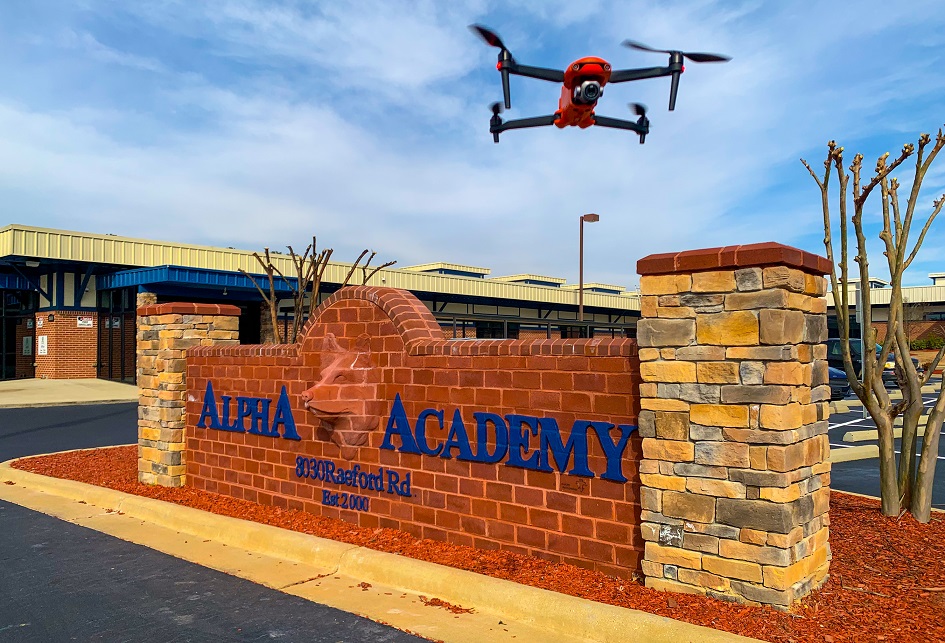
Located just off of Raeford Road as you’re heading out of Fayetteville, Alpha Academy is a tuition-free, public charter school serving students in kindergarten through 12th grades. Dr. Eugene Slocum, founder and CEO of Alpha Academy, received approval for the school in 1999 and the school was started in 2000.
Prior to opening Alpha Academy, Dr. Slocum worked in several different types of industries, but he was always involved in his kids’ education. He spent some time teaching middle school math and then went on to teach at Fayetteville State University. While teaching at FSU he recognized that many of his students had not been adequately prepared during their former years of schooling.
“And the question is, if you had the opportunity of doing something different, what would you do? And that was…one of the things that stuck in my mind: ‘What could I do that would make a difference,’” remarked Dr. Slocum.
With Dr. Slocum and his wife being active members of the community, he was confident that if he were to work to get this school off the ground he would receive support from others in the area.
Once Dr. Slocum got the necessary approval to open the school, he then had to navigate a tight budget as charter schools are not granted the same level of funding as public schools. Slocum was grateful to have dedicated staff who shared his belief that it was about the kids.
“...So we have some good teachers that came through and they help and they support because it was all about being able to help the kids,” said Dr. Slocum.
The amount of money a charter school receives is determined by the number of students the school serves. Dr. Slocum shared that when they first started, the school had about 60 students.
Dr. Slocum shared how for their first few years of operation, classes were being held at whatever location they could afford to occupy. They started off in the gymnasium of a church, then they moved to a dentist’s office, and then a daycare, then next to a rehab center. Despite the unconventional settings, Dr. Slocum made certain the education being provided to the children was top tier.
“But what we tried to do is to make the environment as conducive as possible and the academics [were] at a high level as far as communicating with students, and the parents,” said Dr. Slocum.
In 2010 they moved to the location that they are currently operating from today. “Our facility that we’ve had, we’ve been here since 2010, and we’ve built three times since then… every place that we were previously, we were renting. So now we built from the ground up,” shared Dr. Slocum.
Additionally, charter schools have to meet the same testing requirements as any traditional school; however, they receive less funding and face consequences if they do not uphold the standards.
“...in a charter school, if your students do not perform... They will shut you down,” shared Dr. Slocum.
Alpha Academy students continue to succeed on their exams and demonstrate academic excellence. The school now has close to 1,100 students. There are approximately 50 teachers working at the school, and the full staff of the school is around 125 individuals. Dr. Slocum shared that the average class size is around 25 students.
They started out as a middle school and following their initial success, they expanded to elementary as well. Parents and students then voiced their displeasure at having to change schools once they reached high school.
With the staff and parents on board, Alpha Academy expanded to a K-12 school and they had their first graduating class of seniors this past year.
Alpha Academy is also home to the Katherine G. Johnson STEM institute, named in honor of the extraordinary mathematician whose calculations enabled NASA to send the first U.S. astronauts into space. Around 100 students are involved in this STEM program. Dr. Slocum considers himself blessed to have known such a remarkable woman. She serves as a fantastic role model for the students.”
“...We’re thankful for the blessings that we have as far as having the opportunity of serving these kids, working with the parents, but it's a coordinated effort. It’s about communication. It’s about trust. It's about being patient and understanding, but also is about having high expectations,” said Dr. Slocum.

Kristen Botts co-founded the program with her husband, Nathan Botts, who is a Veteran himself. Photos provided by Kristen Botts.An organization helping Veterans live a full life after their service in the U.S. Military wants to connect Veterans and d

Patrick NoblesHuntington Bancshares Incorporated announced on Feb. 2 that it has closed its merger with Cadence Bank, a regional bank headquartered in Houston, Texas and Tupelo, Miss. This strategic partnership accelerates Huntington’s growth in

There is extensive dialogue surrounding Fayetteville as a travel destination or city aimed at recruiting new businesses and new residents. As someone who moved here from out of state, I thought it could be fun to share my personal experience as